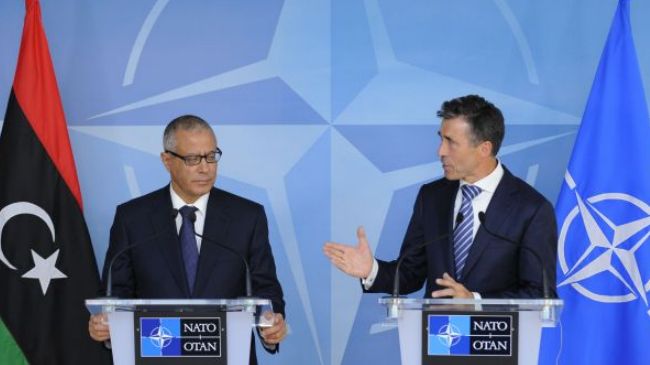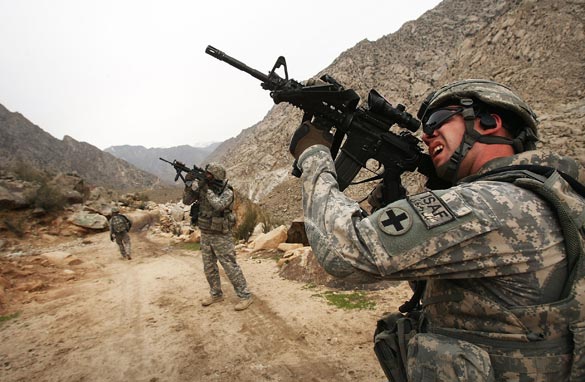Libyan Prime Minister Ali Zeidan was in Brussels on Monday May 27, 2013 to discuss the future of Libyan ties to NATO and to the EU. In a joint press conference with NATO Secretary General Anders Fogh Rasmussen, the Libyan leader told reporters that his country hoped to obtain “technical assistance” from the Alliance in its pursuit of domestic security.
This request received a positive response in Brussels, where Secretary General Rasmussen emphasized NATO’s experience in the reform of security and defense sectors, particularly with respect to the education and training of national armed forces.
On NATO’s behalf, Rasmussen pledged to the Libyan Prime Minister, “We stand ready to help the Libyan government in these areas, where you need us and where we can add value.”
Rasmussen was particularly keen to emphasize that any future capacity building in Libya would be at the strict request of the Libyan government.
A pledge of this nature to Libya is highly significant to Canadians given the likelihood of a Canadian contribution to such assistance in the future. Indeed, Canadian involvement in the 2011 Libyan mission set an impressive precedent for future contributions to the Alliance. It is important to note that although every NATO member voted in favor of the Libyan mission in March 2011, less than half contributed and less than one third took part in air strikes. In contrast, by October 2011, the Canadian Armed Forces had flown nearly ten percent of air sorties. What’s more, Royal Canadian Air Force Lieutenant-General Charles Bouchard directed the operation in full when NATO assumed control in March 2011.
This week’s meetings in Brussels also served to establish closer political ties between NATO, the EU, and the Libyan government. For example, Rasmussen reaffirmed NATO’s support for Libya as a Mediterranean Dialogue partner – an offer originally made at the NATO summit in Chicago last year. European Commission President Jose Manuel Barroso and EU President Herman Van Rompuy also confirmed the EU’s intention to establish a more long-term framework for its ties to Libya.
[captionpix align=”left” theme=”elegant” width=”300″ imgsrc=”http://previous.presstv.ir/photo/20130528/h.sharifi20130528092838540.jpg” captiontext=”Libyan Prime Minister, Ali Zeidan, and NATO Secretary General, Anders Fogh Rasmussen, met on Monday, May 27 2013, to discuss the future of Libyan ties to NATO and the EU. “]
Each of these meetings speaks to a great effort on behalf of the Libyan government to invigorate its international relations. A statement from Prime Minister Zeidan’s office to the Tripoli Post this week stated that Mr. Zeidan’s visit aims “to restore Libya’s regional and international role within the context of building international relations based on collaboration, equality and mutual respect.” In particular, the Libyan prime minister aimed to highlight Libya’s institutional progress and ongoing efforts towards the rule of law since its transition period.
Indeed, in the year and a half that has passed since Colonel Ghadafi was captured and killed, Libya has made undeniable progress towards democratic objectives.
The Economist argues that “the most striking outcome” of Libya’s congressional election in July 2012 was the “relative failure” of extremist groups in this electoral forum. Alleged Islamists in the Justice and Construction party, allied with the Muslim brotherhood, obtained only 17 out of 80 total seats in congress. Victory came instead to a coalition of secular, liberal, and moderate parties that collectively won 39 seats.
Looking forward, Rasmussen told Prime Minister Zeidan on Monday that “It is important that the new Libya continues to move towards a peaceful, secure and democratic future, and we [NATO member states] stand ready to work with you and your government to help secure this future.”
Unfortunately, in light of current circumstances on the ground in Libya, such language seems determinedly o optimistic. Indeed, Libya would not be requesting technical assistance and training for its armed forces were it not for clear threats to its national security.
There was marked increase in violence in Libya this May, including two explosions outside police stations in Benghazi. These attacks took place on 10 May 2013, only three weeks after the bombing of the French embassy in Tripoli and seizure of two government buildings by armed groups. Britain and the United States have since removed some diplomatic staff from their Libyan postings.
This bout of violence is only the most recent to emerge from the power vacuum left by Ghadafi’s defeat. Though united in their cause against Ghadafi’s dictatorship, many armed factions in Libya have since turned on each other, working to defend their own interests, regions, or kin. Indeed, clashes erupted in Benghazi only two months after Ghadafi’s capture in October 2011 and have continued quite unabated since.
Not only is such violence a threat to Libya’s democratic prospects, but this instability also threatens the interests of NATO member countries. Violence in Libya is certain to deter investment, and Western powers also acknowledge the potential for eastern Libya to become a haven for terrorist groups.
It is also important to note that Monday’s discussions in Brussels unfolded in tandem with significant developments on the Syrian front.
After two years of civil war and an estimated 70 000 dead, the EU announced Monday that it intended to lift its arms embargo on Syrian opposition groups. The EU said member states that might wish to export weapons to Syria, such as Britain, “shall assess the export license applications on a case-by-case basis,” according to the organization’s existing rules vis-à-vis arms shipments.
[captionpix align=”left” theme=”elegant” width=”300″ imgsrc=”http://www.cp24.com/polopoly_fs/1.1298047!/httpImage/image.jpg_gen/derivatives/landscape_620/image.jpg” captiontext=”Libyan PM Ali Zeidan with the President of the European Commission José Manuel Barroso.”]
Monday also marked US Senator John McCain’s secret visit to Syria, during which he met with rebel commanders after crossing the Turkish border. McCain has been heavily critical of Prime Minister Obama’s policy vis-à-vis Syria, and advocates US support of Syrian rebels, short of US troops on the ground.
As some NATO member countries ponder involvement on yet another Middle Eastern front, every Alliance member, including Canada, must consider lessons that can be learned from the Libyan case. In particular, with respect to both Libya and Syria, we must consider the consequence of throwing our weight behind a divided opposition.
In Libya, the decision to support the opposition means that two years later, NATO member states are being asked to defend the regime they helped to install. This week in Brussels, the Libyan Prime Minister sought NATO’s assistance in challenging some of the rebel groups that NATO once supported. If NATO member states play a role in the success of the Syrian opposition, similar calls for support may be heard two years from now.
As NATO explores further ties to Libya, and NATO members consider supporting the Syrian opposition movement, the Canadian government, Canadian citizens, and Canadian allies must ask themselves: In committing to Syria, are we prepared for the long haul?




